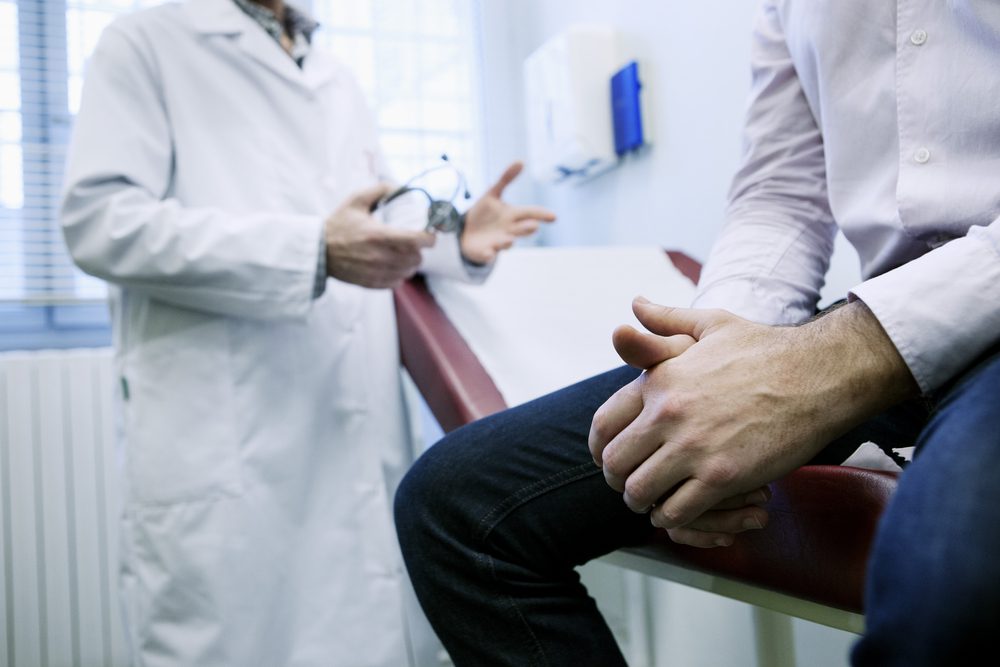When it comes to your health, turning 50 is a watershed moment. As a result, men over the age of 50 must get frequent health examinations in order to improve their quality of life. By making time for frequent health examinations, you and your doctor can spot any underlying problems before they become serious.
Here are a few diagnostic tests for men over 50 that should be included in each health checkup:

1. Prostate Specific Antigen or PSA test
Who needs it: Even though all men are at risk for prostate cancer, the risk increases dramatically as they become older. Men aged 50 and over are at a greater risk of having prostate cancer.
Why it’s important: PSA is a protein generated by both cancerous and normal prostate cells. This antigen aids in the liquefaction of sperm, allowing a little quantity of PSA to reach the circulation.
PSA levels in your blood grow because malignant prostate cells create more PSA than benign ones. Elevated PSA readings may show prostate cancer that is likely to spread to other regions of your body or aid in the detection of cancer that is rapidly progressing and likely to cause other issues.
How it works: The PSA test is a blood test that determines the level of PSA in your blood. PSA readings over a certain threshold may suggest prostate cancer or an enlarged or inflammatory prostate. As a result, establishing a high PSA reading might be difficult at times. To accurately diagnose the illness, a rectal exam may be required.
When to schedule the next one: The PSA concentration is measured in nanograms per milliliter. If your PSA readings are greater than 3 ng/mL, your doctor may recommend a prostate biopsy. If your PSA readings are less than 1 ng/mL, your doctor will most likely recommend that you get another test when you reach 60.
2. Colonoscopy
Who needs it: If you’re 50 or older, your doctor will almost certainly recommend a colonoscopy. If you have particular personality features, such as IBS or a family history of colon cancer, he or she may request that you get the test done sooner.
Why it’s important: A colonoscopy enables your doctor to detect cancer or precancerous growths in the colon and rectum. Small quantities of tissue or development of grape-like tumors called polyps may be removed and submitted to a lab for biopsy if necessary.
This will assist in determining the existence of malignant cancer cells in the colon or rectum. A colonoscopy, in many circumstances, provides an accurate diagnosis and treatment of colorectal issues without the need for a major operation.
How it works: To perform a good colonoscopy, your intestine must be empty so that your doctor can see the colon properly. That is why it is critical to follow all of your doctor’s recommendations at least two weeks before your test. You’ll be given a little sedative or some pain medication by IV on the day of the test.
You’’ also be required to lie on your left side with your knees brought up towards your chest during the exam. The colonoscope is passed into the large intestine after being placed into the rectum. The complete treatment takes between 30 minutes to an hour.
When to schedule your next one: If your colonoscopy reveals no adenomas or malignant growths and you don’t have any risk factors, your next test will be performed in 10 years. The test can be done every 5 to 10 years if one or two modest risk adenomas are eliminated. Your doctor will arrange your next appointment based on the findings of your tests.
3. Blood Pressure Screening
Who needs it: Every adult should get their blood pressure tested on a regular basis. High blood pressure, often known as hypertension, is especially harmful in individuals over the age of 50 because it raises the chance of developing coronary artery disease, which might result in potentially fatal occurrences such as a heart attack or stroke.
Why it’s important: Hypertension damages your blood vessels and increases your risk of heart attack, stroke, and some kinds of dementia. Because persons with high blood pressure seldom display any symptoms, it is commonly referred to as the silent killer. That is why early detection and frequent diagnostic testing are critical to treating hypertension and its consequences.
How it works: A blood pressure screening is non-invasive and is performed with the use of a sphygmomanometer. First, your doctor will tie a cuff over your arm and use a pump to inflate it until circulation is cut off.
A little valve begins deflating the cuff, restoring blood flow to the arm. Your doctor will check your blood pressure and listen to the sound of blood flowing through your arteries using a stethoscope placed over your arm.
The first sound of rushing blood represents systolic blood pressure, while the second number represents diastolic blood pressure or the blood pressure of your heart at rest. A normal blood pressure reading (120/80 mm Hg) will show the systolic pressure first, followed by the diastolic pressure.
When to schedule your next one: If your blood pressure is normal, your doctor will most likely check it during your next yearly physical. Your doctor will prescribe more regular testing if the top number of your reading is more than 140 or the bottom number is bigger than 90.
If you have diabetes, heart disease, renal difficulties, or other medical disorders, your blood pressure may need to be tested more frequently.
4. Lipid Profile or Cholesterol Check
Who needs it: This is a common test that determines the amount of lipid-protein or cholesterol in your blood. Every adult that’s over the age of 20 should get their cholesterol checked every 5 years.
Why it’s important: A comprehensive cholesterol test detects four types of lipids, or fats, in your blood.
The test measures total cholesterol, low-density lipoprotein (LDL) cholesterol, high-density lipoprotein (HDL), and triglycerides in the blood. LDL is considered bad cholesterol, and if you have too much of it increases your risk of heart attack, stroke, and atherosclerosis.
HDL is the beneficial cholesterol that is needed to keep LDL levels under control. Triglycerides are once again detrimental and are deposited as fat in the cells of the body.
A high LDL and triglyceride concentration can cause blocked arteries, preventing your heart from performing correctly and affecting the heart muscles. A regular lipid profile test is essential for males over the age of 50 since it can help forecast the risk of heart disease and stroke.
How it works: This is a basic blood test in which blood is collected from a vein in your arm using a needle. LDL, HDL, total cholesterol, and triglycerides are all measured in your blood. Your doctor will offer you a prognosis based on your cholesterol levels.
When to schedule the next one: You may not need another test for 5 years if your cholesterol levels are in the normal range. If your cholesterol levels are high, your doctor will want to examine your blood more regularly while you try to decrease them via diet, exercise, and other methods.
5. Blood Sugar Screening
Who needs it: Everyone over the age of 45 should have their blood sugar or glucose levels monitored. If you experience any signs of high blood sugar, such as unintentional weight loss, poor healing, or excessive thirst, your doctor will order this test.
Why it’s important: Diabetes can be detected by having high blood sugar levels. It’s classified into two types: Type 1 diabetes, in which your body does not create insulin, and Type 2 diabetes, in which your body rejects insulin.
Diabetes can cause chronically high blood sugar levels and diabetes-related health problems in either instance. Vision issues, renal troubles, and an increased chance of developing coronary heart disease are all possibilities.
How it works: A blood sugar test will be performed to determine your blood sugar levels. Before your blood is obtained for the test, your doctor will ask you to fast for 8 hours. For persons who do not have diabetes or pre-diabetes, healthy blood sugar levels should be between 70 and 100 milligrams.
If your blood sugar levels are high, your doctor will order more tests to determine your illness.
When to schedule the next one: If your blood sugar level is normal, your next blood sugar test will be in three years. If it’s too high, you’ll need to get your blood sugar checked again soon, as well as maybe other tests to see if you have or are at risk for diabetes.
6. Eye Exam
Who needs it: As you become older, regular eye exams become increasingly necessary. Whether you use glasses or contact lenses, it’s a good idea to check with your ophthalmologist to see if your eyesight has deteriorated. Other visual abnormalities that begin to emerge at this age can also be detected with regular eye exams.
Why it’s important: Many eye diseases, such as cataracts, glaucoma, and macular degeneration, may not manifest physical symptoms until they are advanced. When you reach your late 40s, you should have your eyes tested once a year. If you have high blood pressure, diabetes, or a family history of eye illness, these check-ups are even more vital.
How it works: Every ophthalmologist or eye specialist follows a different regimen. Most eye exams, however, follow a similar pattern, with the doctor reviewing your personal and family history to determine whether you are at risk for any eye issues.
Your doctor will do tests to check for vision, eye muscle coordination, light sensitivity, eyelid health, fluid pressure measurement, and other eye attributes based on these considerations.
When to schedule the next one: You should get an eye exam every two years, or as recommended by your doctor. If you detect any changes in your eyesight, make an appointment with your doctor as soon as possible.
When you go in for your next yearly health exam, your doctor will also order a few more tests to assess the normal functioning of your body’s important organs. These might include:
- Kidney Profile: Blood Urea, Serum Urea, Serum Creatinine, Serum Uric Acid
- Urine analysis for infection
- Cardiac risk evaluation: ECG, Stress test
- Chest X-Ray
- Blood Routine: CBC, ESR
7. Immunizations and Infectious Diseases
An annual flu vaccine is advised for everyone. Every ten years, a tetanus-diphtheria booster is advised. According to the CDC, men aged 65 and over should have a pneumococcal vaccine to avoid lung infections like pneumonia and other diseases caused by pneumococcal bacteria. Your doctor may also advise you to receive the shingles (herpes zoster) vaccination.
In terms of infectious diseases, the United States Preventive Services Task Force recommends screening for hepatitis C and, depending on your medical history or certain lifestyle variables, screening for sexually transmitted diseases such as syphilis, chlamydia, HIV, or other infections.
8. Osteoporosis Screening
Men over the age of 70 should consult their doctor about bone mineral density testing. Men who have a family history of osteoporosis or other risk factors should discuss routine screening with their healthcare professionals. Osteoporosis risk factors include:
- Excessive alcohol consumption
- Low body weight
- Long-term steroid usage
- Smoking
- A bone fracture beyond the age of 50
9. Lung Screenings
Lung cancer is the cancer that can be prevented the most. It is present in those who smoke 90% of the time. The remaining people are mainly individuals who are genetically predisposed to it or who have been exposed to secondhand smoke or caustic chemicals.
Lung cancer is frequently discovered by chance during scans performed for another cause. Lung cancer screening is contentious since current methods of scanning are high in radiation.
Lung cancer scientists are investigating towards lower-dose CAT scans, which may be the future of lung cancer screening. As a screening technique, a yearly chest X-ray is suggested.
Protecting Your Health for a Lifetime
Finally, maintaining contact with your primary care physician is the most effective approach to remaining on top of screenings and managing your long-term health.
These MedlinePlus and ODPHP guidelines are obviously helpful, but the guidance you’ll receive from your PCP during your yearly physical examinations and ongoing contact between appointments is much more so.
Make it a habit and a goal to schedule that annual consultation for anything from depression and fall prevention to drug misuse difficulties, prescription interactions, and everything in between. Your future healthy—and hence wealthy—self, as well as your loved ones, will thank you.
You might also like: 8 Signs of a Heart Attack Seniors May Feel






